Related Research Articles

Wasps of the genus Sphex are cosmopolitan predators that sting and paralyze prey insects. Sphex is one of many genera in the old digger wasp family Sphecidae, though most apart from the Sphecinae have now been moved to the family Crabronidae. There are over 130 known Sphex species.

Pison is a cosmopolitan genus of wasps within the family Crabronidae. The genus comprises 145 described species, although many species, especially in South America remain undescribed.

Larra, also known as mole cricket wasps or mole cricket hunters, is a genus of wasps that prey on various species of mole crickets. They have gained prominence as integrated pest management agents.
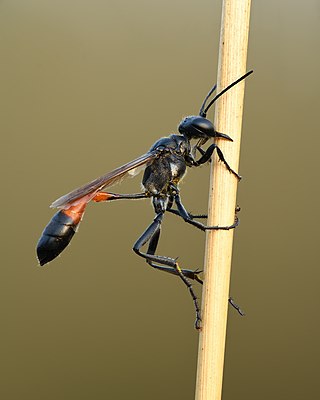
Ammophila is the type genus of the subfamily Ammophilinae of the hunting wasp family Sphecidae. Ammophila is a large and cosmopolitan genus, with over 200 species, mostly occurring in the warmer regions of all continents apart from Antarctica.

Anoplius is a genus of spider wasps in the family Pompilidae called the blue-black spider wasps. It is one of two genera within the tribe Anopliini of subfamily Pompilinae.
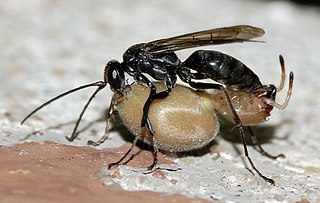
Auplopus is a large genus of spider wasps belonging to the subfamily Pepsinae of the spider wasp family Pompilidae, distributed throughout the world except for Antarctica. Auplopus wasps amputate the legs of their spider prey before transporting it to the nest.
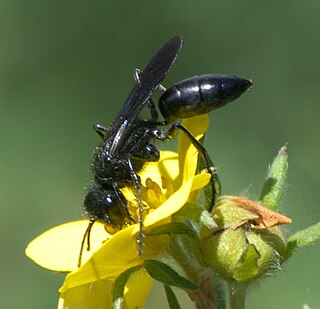
Podalonia is a genus of parasitoidal wasps in the family Sphecidae.

Crabro is a genus of square-headed wasps belonging to the family Crabronidae. There are at least 80 described species in Crabro, found in the Nearctic and Palaearctic (Holarctic).

Rhopalum is a genus of wasps in the family Crabronidae.
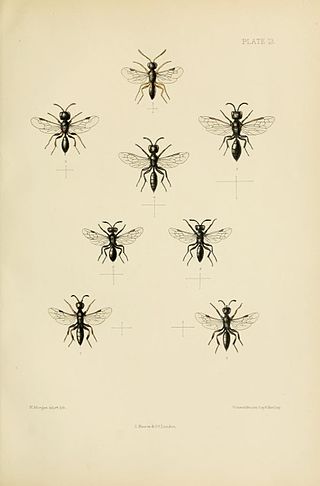
Spilomena is a genus of aphid wasps in the family Crabronidae. The 86 species are found worldwide being represented in the Palearctic, Nearctic, Afrotropical, Neotropical, Australasian, and Indomalayan realms.
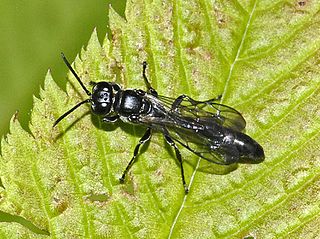
Trypoxylon is a genus of wasps in the family Crabronidae. All Trypoxylon species that have been studied so far are active hunters of spiders, which they paralyse with a venomous sting, to provide as food to their developing larvae. Depending on the species, they will either construct their own nest from mud or find cavities that already exist. These cavities can range from keyholes to nail holes to previously abandoned nests, and are generally sealed with mud to create cells for their larvae.

Psen is a genus of aphid wasps in the family Crabronidae. There are at least 90 described species in Psen.
References
- ↑ "Trypoxylon Genus Information". BugGuide.net. Retrieved 2018-03-08.
- ↑ "Trypoxylon Report". Integrated Taxonomic Information System. Retrieved 2018-03-08.
- ↑ "Trypoxylon Overview". Encyclopedia of Life. Retrieved 2018-03-08.
- ↑ "Browse Trypoxylon". Catalogue of Life. Retrieved 2018-03-08.
- 1 2 Fu, Yan; Bashir, Nawaz Haider; Li, Qiang; Ma, Li (2024-04-29). "A review of Trypoxylon Latreille, 1796 (Hymenoptera, Crabronidae) of Southwest China with descriptions of two new species". Journal of Hymenoptera Research. 97. Pensoft Publishers: 307–347. doi: 10.3897/jhr.97.121279 . ISSN 1314-2607.